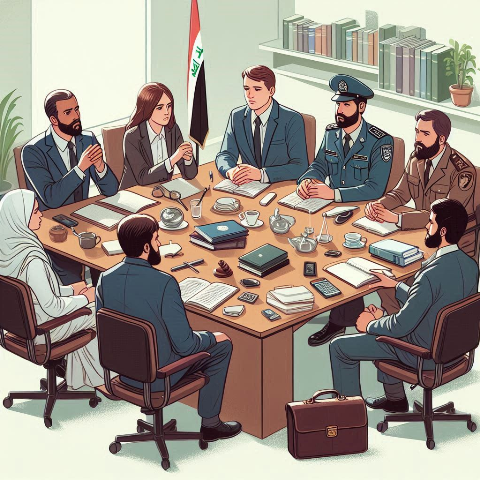UNDP and EU Launch Trial Monitoring Report to Bolster Iraq's Anti-Corruption Efforts
"The findings of this report underscore the Government of Iraq's commitment to curbing corruption and creating a more transparent and equitable society," stated Auke Lootsma, UNDP Iraq’s Resident Representative.

The United Nations Development Programme (UNDP), funded by the European Union, has launched the Trial Monitoring Report in collaboration with Iraq's Supreme Judicial Council and the United Nations Assistance Mission for Iraq (UNAMI) Human Rights Office. This significant initiative highlights Iraq's strides in combating corruption and promoting judicial transparency.
"The findings of this report underscore the Government of Iraq's commitment to curbing corruption and creating a more transparent and equitable society," stated Auke Lootsma, UNDP Iraq’s Resident Representative. "UNDP remains steadfast in our partnership with the Supreme Judicial Council to support critical judicial reforms that will help attract much-needed foreign investment to Iraq."
The report, integral to UNDP's Anti-Corruption and Commercial Dispute Resolution initiatives, emphasizes significant progress in Iraq's judiciary regarding high-level corruption cases. Through a comprehensive quantitative and qualitative analysis, the report provides tailored recommendations to further enhance Iraq's anti-corruption measures and promote the rule of law. Najem Abdullah Ahmed Mohammed, Head of Public Prosecution at the Supreme Judicial Council, reiterated, “Iraq is committed to continue taking steps to curb corruption, build a transparent society, and strengthen citizen trust. We will follow up on the findings and the recommendations of the report.”
“Moving forward, the European Union, along with UNDP and UNAMI, will continue to work closely with the Supreme Judicial Council to implement the report's recommendations and provide targeted assistance where necessary. We are proud to say that these collaborative efforts are aligned with the Government of Iraq's broader priorities in addressing corruption and bolstering the country's economic development,” added Thomas Seiler, European Union Ambassador to Iraq.
Positive Developments in the Fight Against Corruption
Covering the period from August 2022 to July 2023, the report examined significant anti-corruption progress in Iraq, focusing on the work of the Central Anti-Corruption Criminal Court. The analysis of 184 monitored cases and 173 verdicts issued between 2019 and 2022 revealed increased effectiveness in prosecuting high-level corruption cases, particularly those involving significant sums of money and senior government officials.
Key findings include:
An observable increase in the number of resolved cases during the review period.
A rise in convictions, including those of senior government officials.
A decrease in cases being returned to the pre-trial stage.
An increase in trials conducted in absentia, raising concerns about the consistency of penalties and the potential impact of the existing amnesty regime on deterrence.
Geographically, over half (55%) of the monitored corruption cases were concentrated in the Baghdad governorate. Sector-wise, corruption was most prevalent at the governorate and municipal levels and within the Ministries of Finance and Industry. Despite ongoing limitations in civil society engagement with anti-corruption adjudication and investigations, positive developments in the implementation of fair trial rights were noted, in line with international and Iraqi legal standards.
Recommendations for Improving Transparency and Accountability
The report offers a series of measures to enhance transparency and accountability in Iraq's anti-corruption efforts, targeting the government, judiciary, civil society, and international community. Key proposed actions include:
Enhancing Investigative Capabilities: Strengthening the skills and resources available to investigators to more effectively tackle complex corruption cases.
Legislative Amendments: Amending the Penal Code and other relevant legislation to exclude major corruption cases from amnesty provisions, ensuring that serious offenders are held accountable.
Unified Sentencing Policies: Developing consistent sentencing guidelines to ensure fair and proportionate penalties for corruption offenses.
Strengthening Oversight Mechanisms: Enhancing the mechanisms for monitoring and oversight within the judiciary and government agencies to prevent corruption.
Improving Legal Representation: Ensuring that defendants in corruption cases have access to competent legal representation to uphold fair trial standards.
Capacity Building for Civil Society: Providing training and support to civil society organizations to engage more effectively in anti-corruption advocacy and monitoring.
Cross-Border Cooperation for Asset Recovery: Facilitating international collaboration to trace, freeze, and recover assets obtained through corrupt practices.
Court Information Management System: Establishing a comprehensive system for managing and tracking court cases to improve transparency and efficiency.
These recommendations aim to build on the progress made and address ongoing challenges in Iraq's fight against corruption. By implementing these measures, the report envisions a more transparent, accountable, and effective judicial system that upholds the rule of law and strengthens public trust.
The launch of the Trial Monitoring Report represents a significant step forward in Iraq's efforts to combat corruption. With continued support from international partners like the European Union and UNDP, and through the committed efforts of the Iraqi government and judiciary, there is hope for creating a more transparent and equitable society. By addressing the report's findings and implementing its recommendations, Iraq can further strengthen its anti-corruption framework and foster an environment conducive to sustainable development and economic growth.










